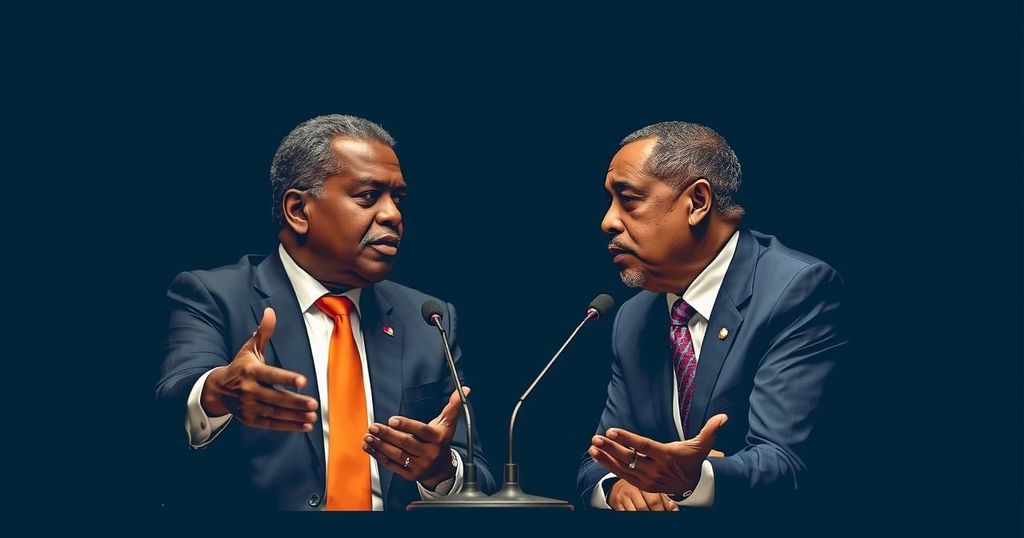DR Congo President Suggests Changes to Term Limits
On October 23, 2023, President Felix Tshisekedi proposed amending the Democratic Republic of Congo’s constitution to potentially change presidential term limits, which has sparked concern among critics fearing a threat to democratic processes. Despite his commitment to respect the constitution, the historical context of past abuses of power complicates this discourse.
On October 23, 2023, during a speech delivered in Kisangani, Democratic Republic of Congo President Felix Tshisekedi proposed amendments to the nation’s constitution, specifically suggesting a potential modification of presidential term limits. Previously, President Tshisekedi had committed to diligently adhering to the constitutional framework. In his address, Tshisekedi characterized the existing constitution as “outdated” and ill-suited for the current realities facing the nation. He announced intentions to establish a commission tasked with drafting a new constitution by 2025, although he emphasized that any decision concerning the alteration of presidential term limits should ultimately rest with the electorate. Support for constitutional amendments has been echoed by various government officials; for instance, the media and communication minister has publicly voiced his approval. Furthermore, on October 10, the secretary general of the ruling party urged its members to advocate for constitutional revisions amongst the party’s supporters. The discussion surrounding presidential term limits carries significant historical weight in the Democratic Republic of Congo. The 2006 constitution, enacted under the leadership of the late President Joseph Kabila, includes Article 220, which explicitly prohibits changes to the number and duration of presidential terms. Despite this stipulation, Kabila successfully extended his tenure beyond the constitutionally sanctioned two terms, leveraging repression and violence. During that tumultuous period, President Tshisekedi was part of the political opposition that called for adherence to constitutional mandates regarding presidential terms. The announcement made by President Tshisekedi has drawn criticism from numerous rights organizations and political opposition groups, who express concerns that he may aim to circumvent the established two-term limit. Recently re-elected in December 2023 amidst electoral violence, Tshisekedi’s government has since employed measures to suppress dissent, increasingly limiting civil liberties such as freedom of expression and the right to peaceful assembly. Currently, several politicians and human rights advocates remain detained without just cause. While amending the constitution is permissible, it is imperative that any proposed alterations reflect and uphold the Democratic Republic of Congo’s commitments under international human rights law, which includes safeguarding the citizens’ right to elect their leaders through authentic and periodic elections.
The Democratic Republic of Congo has a complex political history, especially concerning presidential term limits. Established under the 2006 constitution by former President Joseph Kabila, these limits are contentious and evoke memories of past abuses of power. Following a prolonged tenure by Kabila, culminating in his controversial extension of office past constitutional limits, the country finds itself at a crossroads concerning the authority and duration of its leaders. President Tshisekedi’s recent declaration has reopened debates on this sensitive subject, bringing into question the integrity of democratic processes in the nation and raising alarms among civil society that reforms may be tilted toward consolidating power rather than enhancing democratic governance.
In summary, President Felix Tshisekedi’s recent proposal to consider amendments to the Democratic Republic of Congo’s constitution, particularly concerning presidential term limits, has ignited significant debate. While he advocates for such changes as necessary for progress, many critics perceive it as a potential threat to democratic principles established following years of struggle against authoritarianism. The unfolding political landscape will require careful scrutiny to determine whether reforms align with the nation’s commitments to upholding human rights and safeguarding democratic elections.
Original Source: www.hrw.org




Post Comment